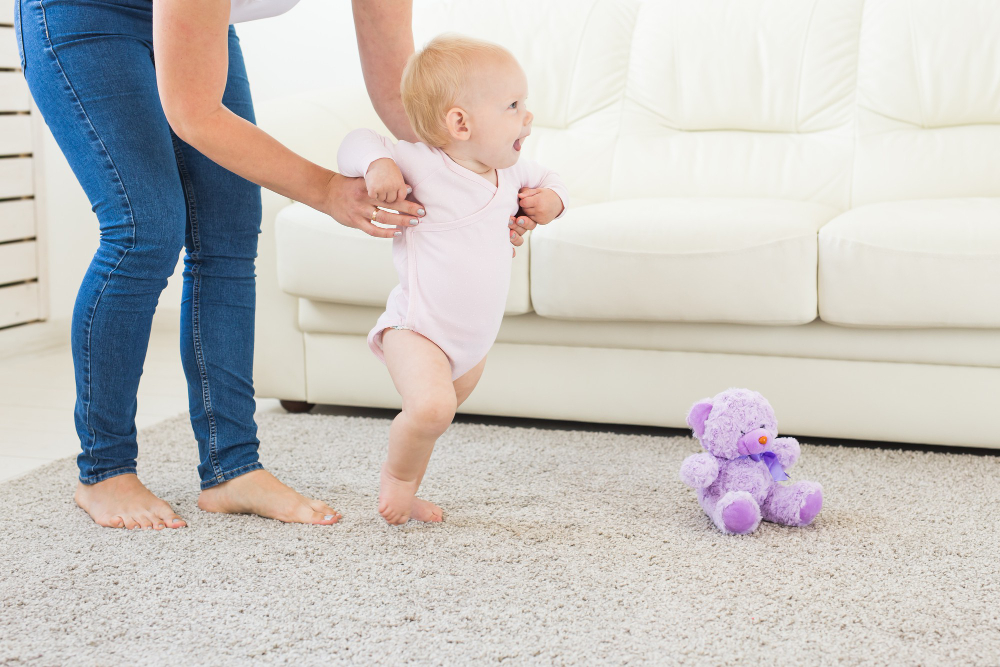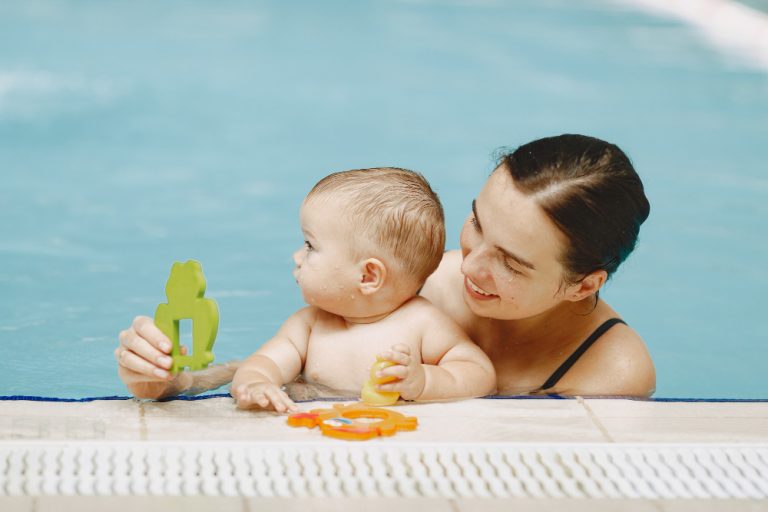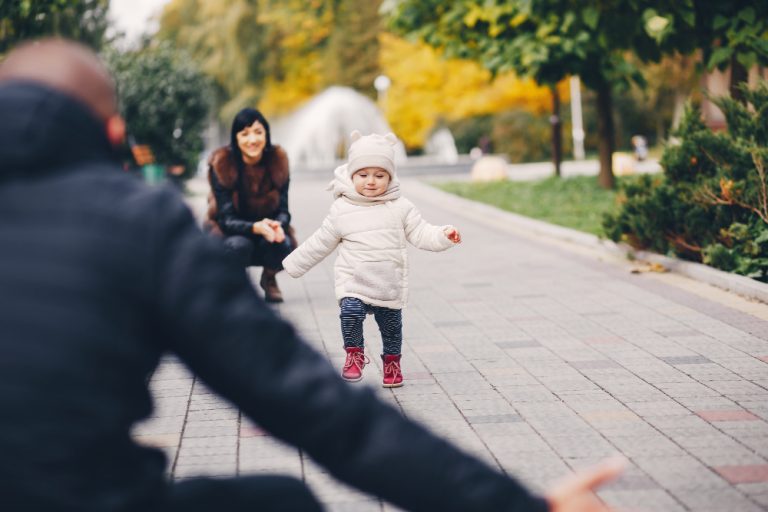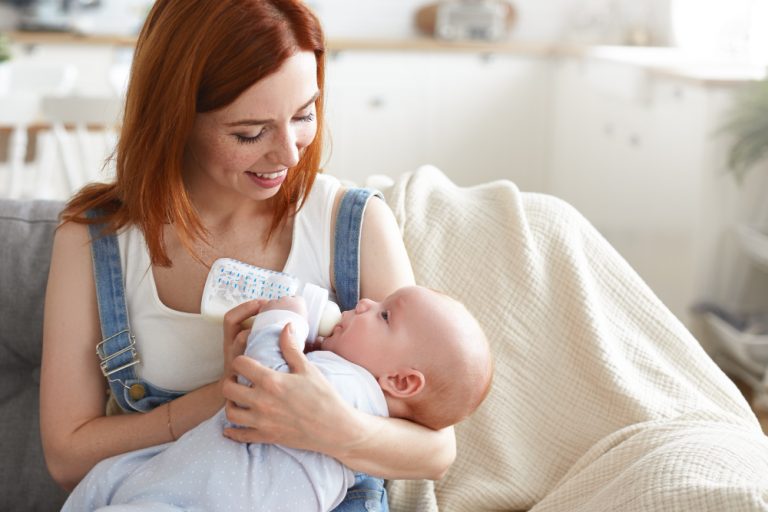When Do Babies Start To Walk? The First Steps Of Joy
Are you eagerly awaiting the moment when your little one takes their first steps? Have you been scouring the internet for clues and signs that indicate your baby is ready to venture on this exciting journey toward independence? Or perhaps, you’re simply curious about the average age when do babies start to walk and the milestones that precede this monumental moment?
Regardless of your reasons, you’ve come to the right place! In this blog, we’ll explore everything you need to know about your baby’s first steps. From subtle indicators to practical tips and strategies, get ready to witness your little explorer conquer the world, one step at a time.
Babies Start To Walk & Related skills
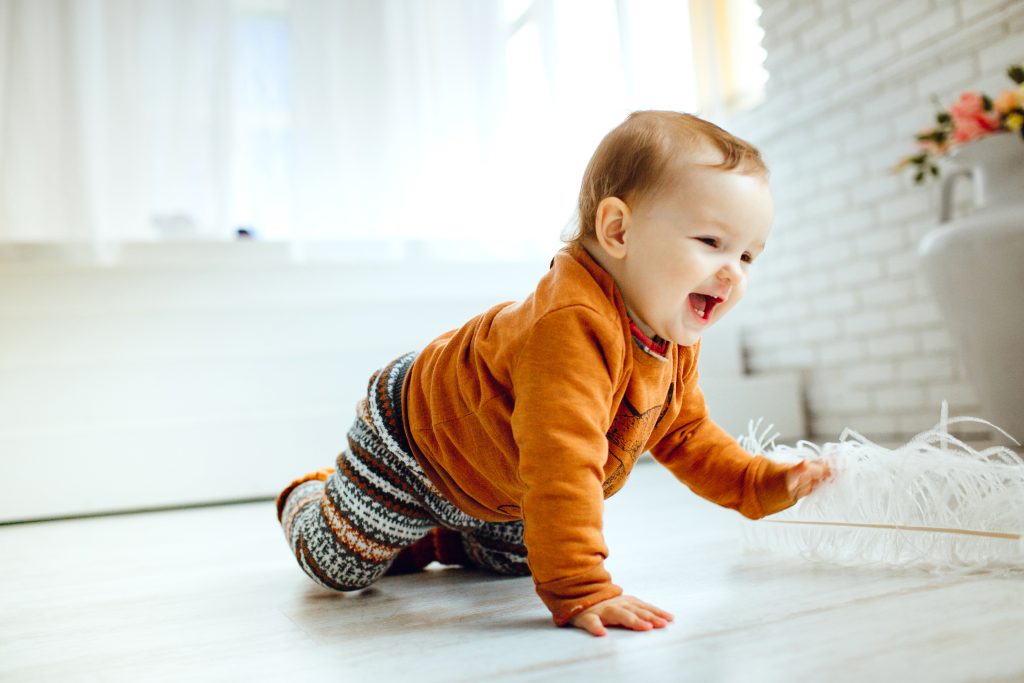
Babies go through a series of developmental milestones before they take that eagerly anticipated first step. These milestones involve the development of specific skills that are related to walking. By understanding these skills, parents can gain insights into their baby’s progress and readiness to start walking.
Here are some critical skills to look out for:
1. Rolling over
Before babies can start walking, they usually learn to roll over from their back to their belly and vice versa. This demonstrates the development of core strength and coordination.
2. Crawling
Crawling helps babies develop upper body strength, coordination, and spatial awareness. It also allows them to explore their surroundings and build confidence in their movements.
3. Sitting independently
Being able to sit unsupported is an important prerequisite for walking. It signifies improved balance and stability.
4. Pulling up
Babies start to pull themselves up using furniture or other supports. This strengthens their leg muscles and prepares them for standing and walking.
5. Cruising
Cruising refers to when a baby holds on to furniture or objects and moves along while standing. It helps them gain confidence and stability as they practice weight-bearing on their legs.
6. Bouncing
Babies often love to bounce up and down while supported by an adult or using a bouncer. This activity strengthens their leg muscles and improves their coordination.
7. Coordination of hands and feet
As babies develop, they begin to coordinate their hand movements with their leg movements. This synchronization is essential for walking.
8. Balance and equilibrium
Babies gradually learn to balance themselves in a variety of positions, such as kneeling or squatting, which are essential for walking.
By observing and encouraging these related skills, parents can provide ample support to their little explorers as they prepare for that incredible moment of taking their first steps. Remember, every baby progresses at their own pace, so it’s important not to compare or have unrealistic expectations.
Enjoy these precious moments of parenthood, and soon enough, you’ll witness your baby’s amazing journey into the world of walking.
When do babies start to walk?
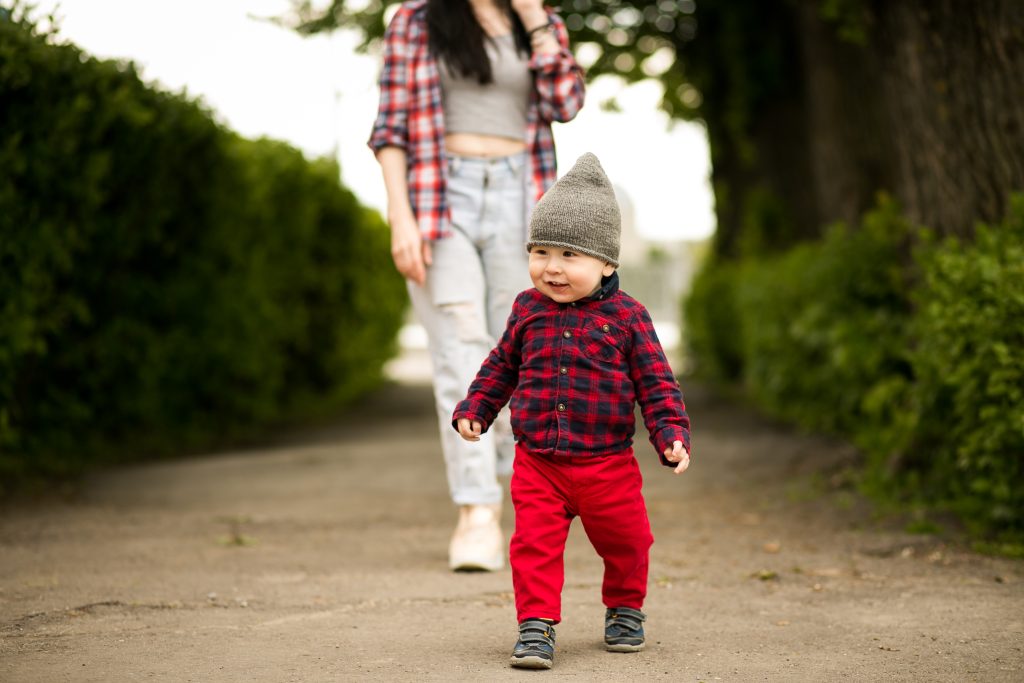
Babies typically start walking between the ages of 9 and 15 months, although this can vary from child to child. It’s important to remember that each baby develops at their own pace, and there is a wide range of what can be considered normal. Some babies may take their first steps as early as 9 months, while others may not start walking until they are 15 months or older.
Several factors can influence the timing of when do babies start to walk:
Muscle strength and coordination
Babies need to develop sufficient leg muscle strength and coordination to support their weight and balance while walking. This development occurs gradually over time as they learn to crawl, pull themselves up, and cruise along furniture.
Motor skills and milestones
Before babies can walk, they need to acquire specific motor skills. These include rolling over, sitting up unassisted, and crawling. These milestones help to strengthen their muscles and improve their overall motor coordination, setting the stage for walking.
Personal temperament and motivation
Some babies may be more eager to explore their environment and gain independence, which can motivate them to start walking earlier. Others may be more cautious and take their time before they feel confident enough to take their first steps.
Environmental factors and encouragement
A baby’s surroundings can also affect their motivation to walk. Providing a safe and supportive environment with plenty of opportunities for exploring can encourage babies to practice their walking skills. Toys such as push toys and baby walkers can also provide support and stimulation.
Remember, it’s essential to consult with your pediatrician if you have concerns about your baby’s development or if your baby hasn’t started walking by 18 months. Every child is unique, and developmental milestones can vary.
Signs your baby will walk soon
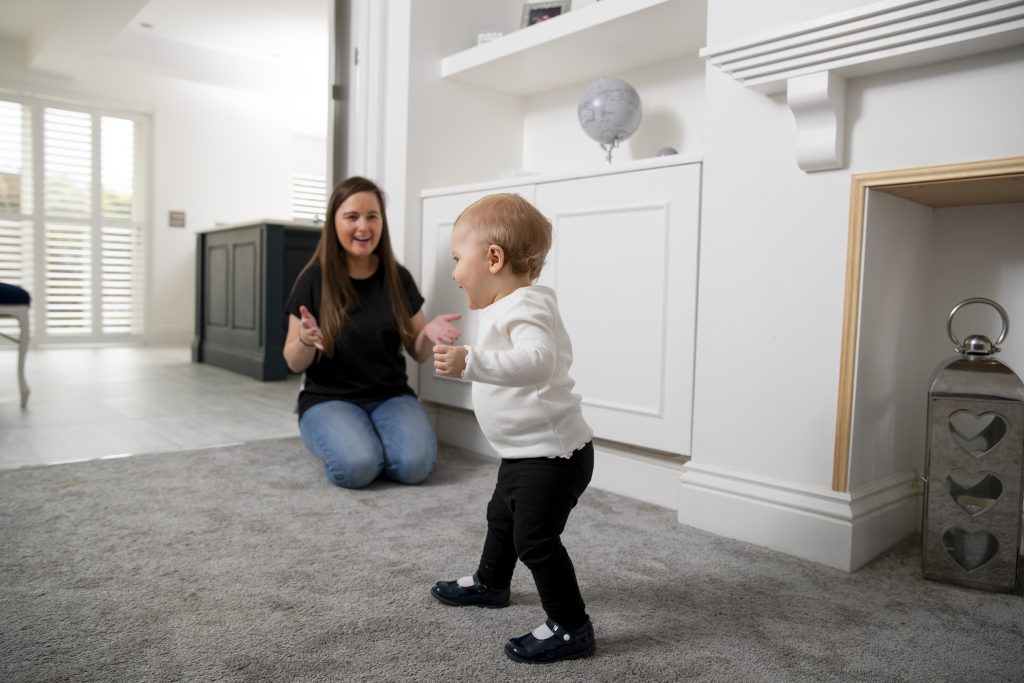
Seeing your baby take their first steps is an exciting milestone in their development. So how do you know if your little one is getting ready to walk? Look out for these signs and milestones that indicate your baby is on the brink of taking their first steps:
1. Pulling up and cruising
One of the first signs is when your baby starts pulling themselves up using furniture or holding onto your hands. They may also start “cruising,” which means moving along furniture while holding on for support. These actions indicate that your baby is developing the strength and balance needed for walking.
2. Standing independently
When your baby starts to stand independently for short periods of time without holding onto anything, it’s a strong indication that walking is just around the corner. They may wobble and even take a few steps before plopping back down, but these milestone moments are key indicators of their walking readiness.
3. Wide-legged stance
You may notice that your baby adopts a wide-legged stance while standing or as they prepare to take a step. This helps them maintain balance and stability as they navigate their newfound mobility.
4. Increased leg muscle strength
As your baby prepares to walk, you may notice a noticeable increase in their leg muscle strength. They will start to show improved coordination and control over their leg movements. Encourage this development by providing opportunities for crawling, rolling, and playing on the floor.
5. Adventurous exploration
Babies who are on the verge of walking tend to become more adventurous in their explorations. They may attempt to reach for objects just out of reach, crawl through small spaces, or even attempt to climb. Keep a watchful eye on them and create a safe environment for their explorations.
Remember, every baby develops at its own pace, so don’t worry if your baby takes a little longer to start walking than others. If you have any concerns about your baby’s walking development, always consult with your pediatrician for guidance and reassurance.
By observing these signs and milestones, you can recognize when your baby is getting ready to take their first steps. Celebrate each achievement along the way and provide a safe and supportive environment for their walking journey. Enjoy this exciting time in your baby’s development and savor every step they take towards independence.
How to Encourage Walking in Babies (Safely)

As parents, we eagerly await the moment when our little ones take their first steps. Encouraging and supporting your baby’s development of walking skills is an important part of their overall physical growth.
Here are some tips and strategies to help you navigate this exciting milestone safely:
1. Create a Safe and Supportive Environment
- Clear the walking area
Remove any potential hazards, such as sharp objects or furniture with sharp corners. Keep the floor clutter-free to provide a safe space for your baby to explore.
- Use safety gates
Install safety gates around staircases and other areas where your baby should not have access. This will prevent accidents and give you peace of mind.
- Cushion hard surfaces
If your baby is still a bit wobbly, placing soft cushions or mats on hard floors can provide a safer landing if they stumble or fall.
2. Engage in Interactive Play
- Encourage tummy time
Allowing your baby to spend time on its tummy strengthens its neck and core muscles, which are essential for walking. Supervised tummy time also helps develop its spatial awareness and balance.
- Use toys as motivators
Place toys slightly out of reach to encourage your baby to take steps towards them. This playful incentive can stimulate their curiosity and desire to explore.
3. Offer Supportive Assistance
- Hold their hands
Give your baby a gentle grip as they try to stand or take their first steps. This provides support and stability while also building their confidence.
- Invest in a push toy or baby walker
These walking aids can help your baby practice their steps while offering them something to hold onto for balance. Always supervise their use to ensure safety.
4. Celebrate Milestones and Progress
- Praise their efforts
Positive reinforcement is vital during this stage. Encourage your baby with applause, smiles, and kind words to boost their motivation and joy in their achievements.
- Celebrate small victories
Be patient and celebrate each milestone, whether it’s standing for a few seconds or taking small, unsteady steps. This encouragement reinforces their progress and promotes a sense of accomplishment.
Remember, every baby develops at their own pace. While it’s exciting to see your baby take those first steps, it’s important to provide a safe and supportive environment and allow them to progress naturally.
If you have concerns about your baby’s walking development or any potential issues, consult with your pediatrician for guidance and reassurance.
By creating a safe environment, engaging in interactive play, offering supportive assistance, and celebrating milestones and progress, you can actively encourage and support your baby’s development of walking skills.
Remember to prioritize safety at all times and enjoy this special journey of your little one’s growth.
When should your baby start wearing shoes?

Introducing shoes to a baby who is learning to walk is an exciting milestone. However, it is important to consider the appropriate timing and choose the right type of shoes to support their development.
Here are some guidelines to help you determine when your baby should start wearing shoes and what kind of shoes are best suited for this stage:
Timing
Babies typically begin to walk between the ages of 9 and 18 months. Before this milestone, it is recommended that they explore and strengthen their leg muscles barefoot or with nonslip socks. Walking barefoot allows their feet to develop a natural grip and sensory perception, which aids in balance and coordination.
Shoe Types
When it comes to choosing shoes for your baby, opt for soft-soled or flexible shoes that mimic the barefoot experience. These shoes allow for natural foot movement and provide protection without restricting their developing feet. Look for shoes made from breathable materials that provide ample support and room for toes to move freely.
Sizing
Proper shoe sizing is crucial for your baby’s comfort and development. Visit a shoe store that specializes in children’s shoes to have your baby’s feet measured accurately. Remember that their feet may grow quickly, so check the fit regularly and adjust shoe sizes accordingly.
Safety Considerations
Ensure that the shoes you choose have nonslip soles to prevent accidents while walking on different surfaces. Avoid shoes with laces or buckles, as they can be challenging for you to put on and take off. Velcro or elastic closures are more convenient options.
Consult with a Pediatrician
If you have any concerns about your baby’s foot development or the appropriate time to introduce shoes, consult with your pediatrician. They can provide personalized guidance based on your baby’s individual needs and milestones.
Remember, every child develops at their own pace, so don’t compare your baby’s progress to others. With time and practice, your little one will soon be confidently taking their first steps.
When to Talk to Your Doctor About Your Baby’s Walking

It’s natural for parents to be excited about their baby’s walking milestones, but it’s essential to be aware of potential developmental delays or issues. Here are some red flags and warning signs to look out for, which may require you to have a conversation with your baby’s doctor:
Delayed Walking Milestones
- While there is a wide range of normalcy when it comes to reaching developmental milestones, if your baby shows no interest in standing or taking steps by around 18 months, it could be a cause for concern.
- If your baby is not able to bear weight on their legs or stand with support by 12 months, it may indicate a delay in their gross motor skill development.
Abnormal Walking Patterns
- If your baby continues to walk exclusively on their tiptoes (toe-walking) after their second birthday, it is worth discussing with their doctor.
- Persistent asymmetrical walking, in which one foot turns inward or outward significantly more than the other, can also be a sign of potential issues.
Lack of Motor Coordination
- If your baby consistently falls or is unsteady while walking, it could be a sign of poor balance and coordination.
- Difficulty coordinating both sides of their body, such as not swinging both arms while walking, may also warrant further evaluation.
Regression or Loss of Skills
- If your baby previously achieved certain walking milestones but has regressed or lost those skills, it is important to mention it to the doctor.
- Any significant loss of balance or strength in their legs should not be ignored.
Remember, every child develops at their own pace, but it’s essential to trust your instincts as a parent. Don’t hesitate to consult with your baby’s healthcare provider if you have any concerns about their walking progression.
Early intervention can make a significant difference in addressing any potential issues and ensuring your baby’s optimal development.
Research & Resources
Here are some valuable resources and references for further reading on the topic of babies starting to walk:
1. American Academy of Pediatrics (AAP)
The AAP offers comprehensive information on child development, including milestones such as walking. Visit their website for expert guidance and advice from pediatricians.
2. Cleveland Clinic
The Cleveland Clinic provides useful articles and videos on various aspects of child development, including walking. Here, you can find helpful tips and strategies for supporting your baby’s walking journey.
3. Centers for Disease Control and Prevention (CDC)
The CDC offers insights into child development and milestones. Their website provides guidance on when to talk to a doctor about your baby’s walking progress and highlights potential red flags to look out for.
Remember, each child is unique, and their development may vary. It is always best to consult with your child’s pediatrician if you have any concerns or questions about your baby’s walking progress.
Use these resources to gain further knowledge and guidance to support your little explorer as they take their first steps into the world of walking.
The Final Note: When Do Babies Start To Walk
To sum up, when do babies start to walk is a question that every parent asks at some point during their child’s development. While there is no exact answer, as every baby develops at their own pace, understanding the related skills and milestones that precede walking can help parents to support and encourage their little ones.
Remember, every moment of your baby’s development is precious, so enjoy the journey and celebrate each milestone they achieve, no matter how small.
With patience, love, and support, your little one will soon be exploring the world on their own two feet!
FAQs: When Do Babies Start To Walk
1. What are the signs that my baby is ready to start walking?
Answer: Some signs that indicate your baby is getting ready to walk include pulling up and cruising, crawling, sitting independently, coordinating hands and feet, and developing balance and equilibrium.
2. What are some activities that can help my baby prepare for walking?
Answer: Activities that can help your baby prepare for walking include tummy time, crawling, bouncing, standing while holding onto furniture, and playing with push toys and baby walkers.
3. What if my baby hasn’t started walking by 15 months?
Answer: It’s essential to consult with your pediatrician if your baby hasn’t started walking by 15 months or if you have concerns about their development. Every child is unique, and developmental milestones can vary.
4. Are there any environmental factors that can influence when my baby starts walking?
Answer: Yes, providing a safe and supportive environment with plenty of opportunities for exploring can encourage babies to practice their walking skills. Toys such as push toys and baby walkers can also provide support and stimulation.
5. What are the average ages when do babies start to walk?
Answer: Babies typically start walking between the ages of 9 and 15 months, although this can vary from child to child. Some babies may take their first steps as early as 9 months, while others may not start walking until they are 15 months or older.
6. How can I encourage my baby to take their first steps?
Answer: You can encourage your baby to take their first steps by providing a safe and supportive environment, offering plenty of opportunities for exploration and practice, and praising and encouraging their efforts. It’s also important to avoid comparing your baby’s progress to other children or setting unrealistic expectations.
7. What should I do if my baby falls while learning to walk?
Answer: Falls are normal parts of the walking learning process. You can help your baby by providing a safe and padded environment, supervising them closely, and offering comfort and reassurance when they fall. If you notice any concerning symptoms or if your baby experiences a severe fall, consult with your pediatrician.
8. Are there any developmental milestones that my baby should reach before learning to walk?
Answer: Yes, before babies can learn to walk, they typically need to reach certain developmental milestones, such as rolling over, crawling, sitting independently, pulling up, cruising, and developing coordination and balance. These milestones help to strengthen their muscles and improve their overall motor coordination.

